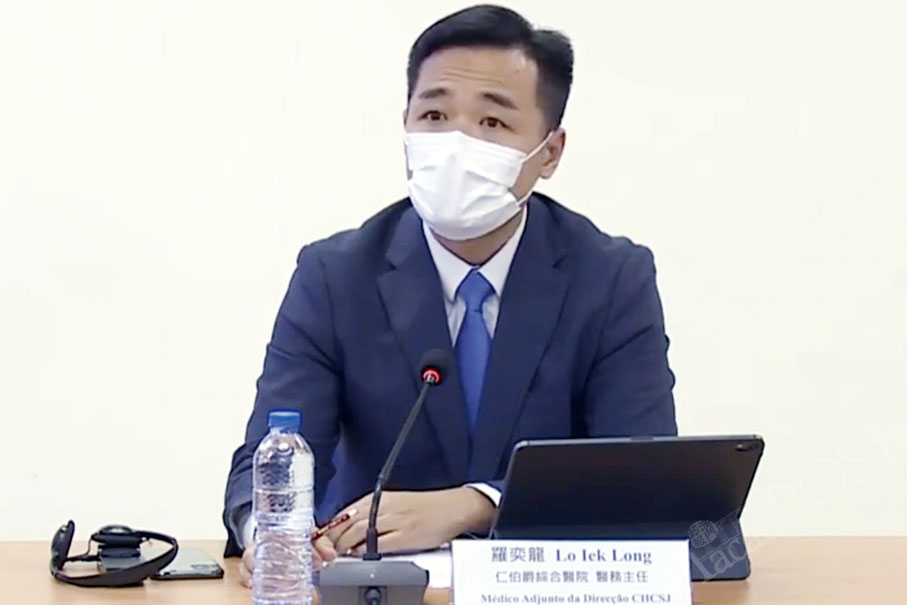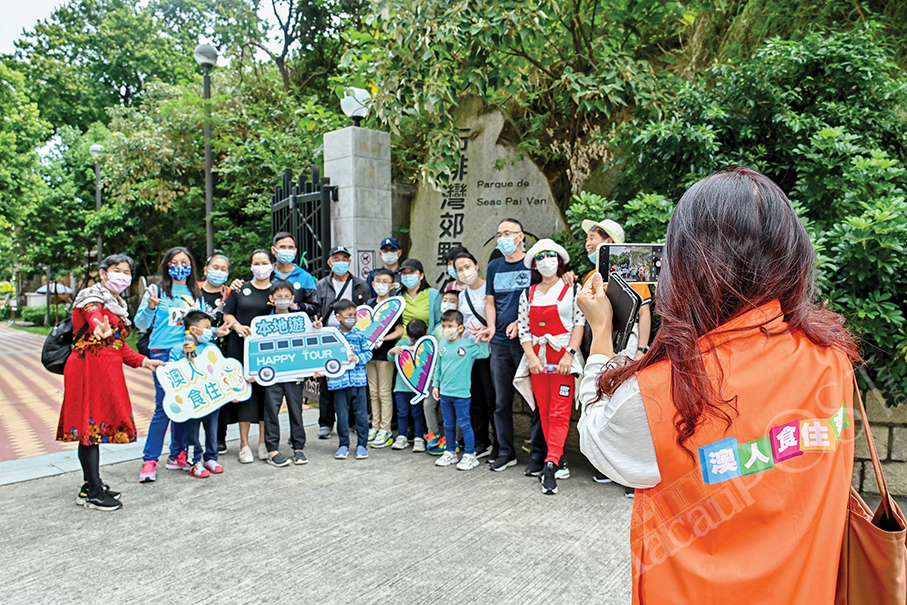Addressing yesterday’s daily press conference about Macau’s novel coronavirus (COVID-19) situation, Alvis Lo Iek Long, a clinical director of the public Conde de São Januário Hospital Centre, said that the public hospital is studying the possible partial resumption of visitations as the COVID-19 epidemic situation in Macau has eased.
The public hospital suspended visitations in late January after the COVID-19 epidemic emerged in Macau. In special cases, the hospital arranges video visits.
Macau’s “first wave” of the COVID-19 infection lasted from January 22 to February 4.
Macau has not confirmed a new COVID-19 case for 15 consecutive days in the “second wave” – which began on March 15 – after the 45th and so far last case was confirmed on April 8.
“Various government entities are assessing whether their respective facilities can reopen. The Health Bureau is assessing whether the public hospital’s visitations can be partially resumed,” Lo said.

1 more COVID-19 patient discharged
Meanwhile, Lo announced the discharge of Macau’s 37th COVID-19 patient yesterday, a 32-year-old local male resident holding Portuguese nationality – the fiancé of Macau’s 11th patient who is a South Korean flight attendant, taking the number of those no longer requiring hospitalisation to 27 among Macau’s total of 45 COVID-19 cases.
According to Lo, the 32-year-old man and his fiancée departed from Porto on March 12 for Hong Kong via Dubai, before arriving in Macau on March 14. As his fiancée, an Air Macau flight attendant, was diagnosed with the novel coronavirus disease on March 15, he was transferred to the Health Bureau’s Public Health Clinical Centre in Coloane the next day for 14 days of quarantine and medical observation. He tested positive for COVID-19 on March 28.
According to Lo, the man met the official criteria for a COVID-19 patient to be discharged after 27-day treatment in the isolation ward. He was transferred to the Coloane Public Health Clinical Centre yesterday for 14 days of recovery period isolation.
18 still in hospital
Following yesterday’s discharge of the patient, a total of 18 COVID-19 patients remain hospitalised.
Macau has so far confirmed 45 COVID-19 cases. Macau’s 10 “first wave” patients – comprising seven tourists from Wuhan and three locals – have all been discharged, while 17 of the 35 patients in the “second wave” have been discharged since last week. All the 35 cases in the “second wave” have been classified as imported, most of them local students returning from overseas.
Sheraton’s ‘special isolated area’ to return to hospitality role
Meanwhile, Inês Chan Lou, who heads the Licensing and Inspection Department of the Macau Government Tourism Office (MGTO), announced during yesterday’s press conference that a section comprising 500 rooms – officially known as “special isolated area” – of the Sheraton Grand hotel in Cotai, one of the government’s “quarantine hotels”, will return to its normal hospitality role, following disinfection and cleaning.
At the peak late last month, there were 12 “quarantine hotels” with about 3,000 guestrooms when some 2,800 people were undergoing their 14 days of quarantine and medical observation.
Since early this month when Metropole Hotel in the city centre became the first of the government’s “quarantine hotels” to return to its normal hospitality role, more hotels have followed suit one after another once all those who completed their 14-day quarantine and medical observation had checked out.
The two remaining “quarantine hotels” are the 298-room Pousada Marina Infante in Cotai and the 300-room Golden Crown China Hotel opposite the airport in Taipa.
Chan said that as of yesterday afternoon 163 people were still undergoing their 14 days of quarantine and medical observation in the government’s two remaining “quarantine hotels” – comprising 101 Macau residents as well as 62 non-resident workers and visitors.
Chan said that the remaining number of government-designated hotels for quarantine and medical observation purposes was enough due to Macau’s very low number of entries and exits resulting from the still very strict entry rules put in place by Macau and its neighbouring regions.
“Concerning the required number of hotels for medical observation purposes, we are assessing the current entry restriction measures implemented by Macau, its neighbouring regions and far-away countries. We can see that the cross-border flow of people around the world is currently at a very low level…and Macau’s entry and exit figures are very low. Our assessment shows that the current number of quarantine hotels is enough,” Chan said.
“Consequently, for the time being the previous [quarantine] hotels from which those [who completed their 14-day medical observation] checked out of will no longer be used as hotels for medical observation purposes,” Chan said.
Chan said that the owners of many of the previous “quarantine” hotels have “expressed their willingness to continue supporting the government” if it would need more “quarantine” guestrooms again in the future.
The government has paid the hotels for the guestrooms occupied by those in quarantine.
Day nurseries
Meanwhile, Choi Pui Ying, who heads the Social Facilities Licensing and Inspection Division of the Social Welfare Bureau (IAS), said during yesterday’s press conference that while her bureau had ordered the city’s day nurseries subsidised by the government to suspend operations since February, non-subsidised day nurseries in the private market could still open to meet the needs of parents who require their children to be looked after there.
Choi underlined that these day nurseries are only allowed to run in a limited way. She pointed out that each of these day nurseries must look after the children in different time slots. Each session can only last 1 1/2 to 2 hours, Choi said, urging non-subsidised day nurseries to suspend operations if their services are not absolutely needed. She also urged parents to place their young children’s health and safety first when deciding whether to take them to a day nursery.








